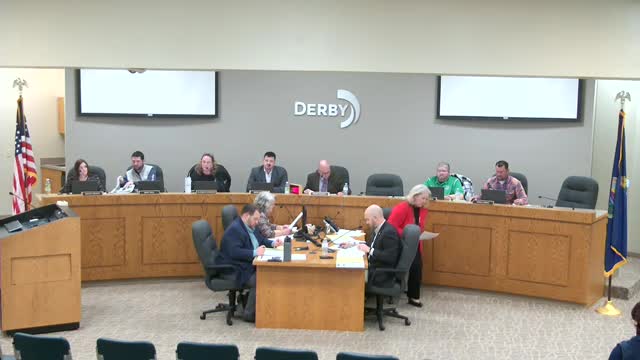Derby city attorney reviews Open Meetings and Open Records law; council asks about social media, executive sessions
Get AI-powered insights, summaries, and transcripts
Subscribe
Summary
Derby City Council on Jan. 28 heard an annual review of the Kansas Open Meetings Act and Kansas Open Records Act from the city attorney, who urged elected officials and staff to be cautious with serial communications, social media interactions and e-mail “reply all” exchanges.
Derby City Council on Jan. 28 heard an annual review of the Kansas Open Meetings Act and Kansas Open Records Act from the city attorney, who urged elected officials and staff to be cautious with serial communications, social media interactions and e-mail “reply all” exchanges.
The presentation explained why meetings must be open, what counts as a “meeting” under state law and how interactive serial communications — phone calls, texts, e‑mails or social‑media threads that involve a majority of a governing body and a shared topic of city business — can trigger a statutory violation. "It is a shared responsibility between staff and the elected officials," the city attorney said, adding that transparency "builds credibility" and deters misconduct.
City Attorney Jackie told the council that the Kansas statute requires reasonable notice of meetings and access to agendas, and that cameras and recording devices must be allowed during public meetings though the city may set reasonable rules to preserve decorum. She also said the law does not require that public comment be permitted at every agenda item; public‑hearing topics required by statute remain a separate process.
Council members pressed on how the statutes apply to modern communication. Jackie said a social‑media exchange can be treated as a meeting if a majority of the body engages in an interactive discussion about city business with the intent to reach agreement. "Discussions on social media, even about past actions," she said, "have been found in some cases to be a meeting." She cautioned that even likes or short replies could create perception issues if multiple members react to the same post.
Council members and staff discussed practical steps. The city attorney advised against using "reply all" when responding to e‑mails sent to multiple council members and suggested routing constituent e‑mail through staff when appropriate. Council Member Coleman described a practice of including the mayor and the council president on responses to keep colleagues informed; Jackie suggested staff could collate responses to limit interactive exchanges among a majority of members. Several council members and staff said they prefer to forward questionable social‑media posts to communications staff so the city can publish an official correction when needed.
Jackie reviewed executive sessions and said they must be entered by formal motion that states the subject matter, the statutory reason and the time when the open meeting will resume. She warned that executive sessions are discussion only — no binding action — and said the stated return time is intended to allow the public to know when the open meeting will resume. "Executive session is a recess, not an adjournment," she said, and noted councils may return to executive session by repeating the required motion if more time is needed.
On open records, Jackie reminded the council that Kansas law broadly defines public records and requires a response within three business days; staff may provide records, estimate a time to compile and review them, or deny requests that are clearly exempt. She noted common exemptions such as HIPAA, FERPA and certain law‑enforcement records and said the city can redact exempt information and charge reasonable fees for search, copying and redaction.
Council members asked about enforcement and penalties. Jackie said remedies can include declaratory judgments or injunctions, civil penalties (up to $500 per violation), and in extreme cases actions to void votes or remove officials, and she said many enforcement matters are resolved through remedial steps or training.
The session included guidance on conflicts of interest and quasi‑judicial proceedings (for example, zoning hearings), where Jackie advised disclosure of ex parte contacts and cautioned that nondisclosure can increase the risk of successful legal challenge.
No formal action was taken; the presentation ended with an offer from the city attorney to help council members draft disclosures or responses when they receive constituent contacts or social‑media posts that could raise procedural concerns.
